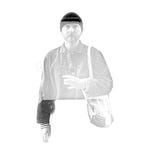On Visconti’s The Leopard.
A while ago I made the somewhat naive assertion that Luchino Visconti’s Rocco And His Brothers was the greatest Italian film of all time. I somewhat naively stand by it.
I’m a bit of a philistine when it comes to Italian cinema. I understand why it’s so revered but don’t understand why it’s so revered. I get it but I don’t get it. Visconti tends to succeed where others such as Rossellini or Fellini fail though; His cinema inspires and moves me.
I revisited his best-known film, the Burt Lancaster-starring The Leopard, a few days ago. It’s a beautiful picture, with every frame as aesthetically satisfying and as hangable as a Renaissance painting.
For all it’s scale and scope (it’s a huge picture) The Leopard revels in the intimate. Lavish spaces shielding the central protagonist and his family (and by extension the viewer) from the harsh realities of revolution. “Fires on the mountain” are referred to in the early section of the film, but we don’t see them, with the thing instead playing out a bitlike an art installation or a chamber piece, or even a post-millenial no-budget piece of indie cinema. There’s a brief break from the intimacy as the canvas opens up and “War Is Hell” plays out for twenty minutes, but even then it feels relatively disconnected from the central truth of the picture (this despite the fact that one of the film’s key players is involved in said battle). The action is shot from above, with war played out as tapestry. It’s immediate but aeons away.
Ultimately Visconti’s film is about big ideas presented personally. It’s about the of an era, the end of an age, the end of ideas. Lancaster features in just about every shot of the lengthy movie, and it’s with him with whom we shed a tear for the passing of a time that we otherwise have no emotional connection to. It’s through him that we understand why we mourn said passing. It’s a powerhouse turn, one for the ages.
